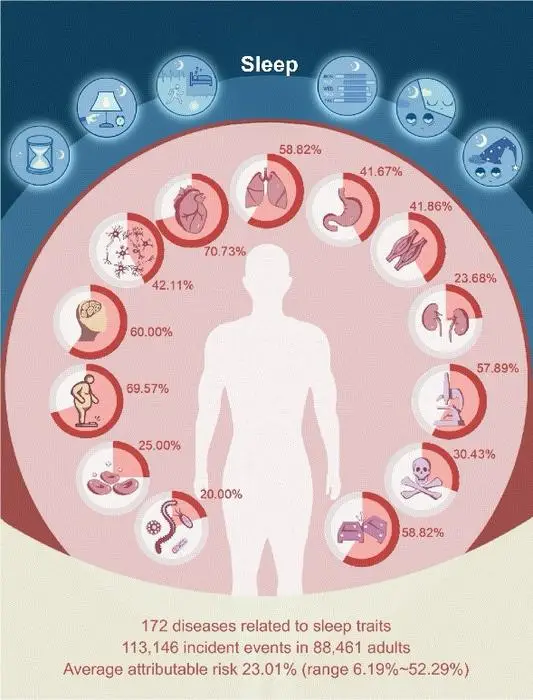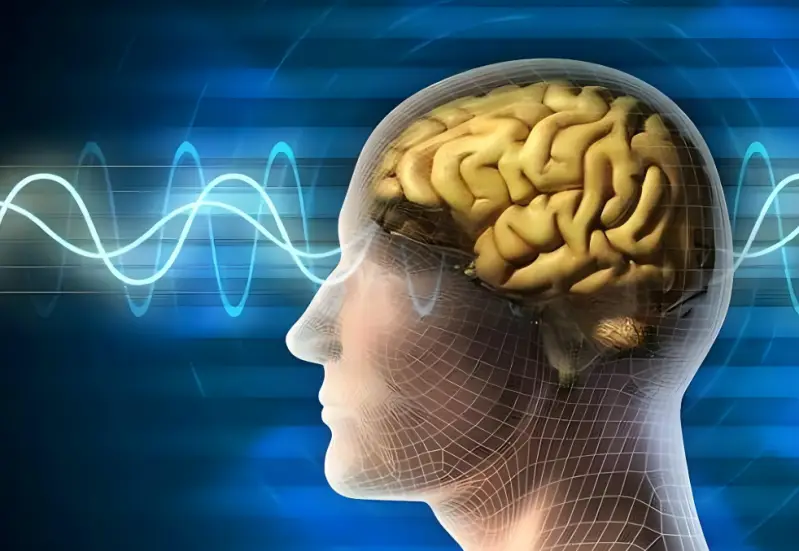Today, sleep problems have become an invisible health threat plaguing countless people.
Recently, a major study published in the internationally renowned journal Health Data Science has sounded the alarm for the public. The study clearly revealed a significant correlation between sleep characteristics and 172 diseases. Of these, over 20% of the risk for 92 diseases stems from abnormal sleep behavior, and 83 diseases are closely related to sleep rhythm disorders.
This means that poor sleep is no longer simply a case of "yawning more" but a potential health hazard that can trigger a variety of illnesses, demanding our attention.

◆ Organs "Working Overtime": Insufficient Sleep Triggers a Systemic Chain Reaction
When our fast-paced lives make sleep a "luxury," our bodies fail to adapt. Instead, they enter a series of overload modes, forcing organs throughout the body to work overtime, triggering a series of health-damaging chain reactions.
From a hormonal perspective, sleep is a crucial biological clock that regulates hormone secretion.
Insufficient sleep disrupts the secretion of melatonin, which regulates sleep and wakefulness, impairing metabolic function and increasing the risk of metabolic diseases such as obesity and diabetes.
At the same time, the secretion of growth hormone, which promotes growth and development and repairs tissue cells, decreases. This not only impacts the growth and development of children and adolescents but also accelerates the aging process in adults, leading to decreased skin elasticity, increased wrinkles, and a decline in physical function.
The immune system is the body's first line of defense against disease, and sleep is a critical period for the immune system to recuperate. Chronic sleep deprivation can significantly reduce the activity of NK cells (natural killer cells), the mainstay of the immune system. This makes them unable to effectively identify and eliminate harmful substances such as cancer cells and virus-infected cells. Simultaneously, a surge of inflammatory factors is released, triggering a "cytokine storm." This chronic inflammatory state continuously damages tissues, increasing the risk of common infections like colds and flu, as well as major diseases like cancer and cardiovascular disease.

The brain, the body's most sophisticated organ, requires sleep to "self-clean." During sleep, the brain activates its glymphatic system, acting like a vacuum cleaner to remove metabolic waste produced during the day. This includes beta-amyloid, a protein closely linked to Alzheimer's disease.
Without adequate sleep, this brain cleansing process is interrupted, and beta-amyloid accumulates in the brain, gradually damaging nerve cells, leading to memory loss and cognitive decline, ultimately significantly increasing the risk of dementia.
Clinical data clearly demonstrates the harmful effects of insufficient sleep:
- People who chronically sleep less than six hours a day are 2.8 times more likely to develop cardiovascular and cerebrovascular diseases such as hypertension, coronary heart disease, and stroke than those who sleep normally (7-8 hours a day).
- Insufficient sleep also affects mood regulation, leading to the accumulation of negative emotions such as anxiety and depression. The incidence of anxiety disorders is 3.1 times higher than in people with normal sleep.
◆ Scientific Response: A Comprehensive Plan from Assessment to Intervention
Faced with the numerous health risks associated with insufficient sleep, blindly "catching up on sleep" or relying on sleep aids are not long-term solutions. Only by adopting a scientific approach and developing a comprehensive response plan, from risk assessment to targeted intervention, can we truly improve sleep quality and protect our health.
1. Quantitative Risk Assessment: Understanding the "Baseline" of Sleep Health
To scientifically improve sleep, you first need to understand the severity of your sleep problems and whether they are potentially impacting your health.
It is recommended to prioritize professional health assessment tools to quantify your sleep health and overall health risks.
The HRA health risk assessment uses bioelectric sensing technology to rapidly monitor the functional status of multiple body systems. It not only assesses the impact of sleep quality on the metabolic, immune, and cardiovascular systems, but also identifies potential health risks in advance, providing comprehensive health data support for subsequent sleep improvement plans.
Cognitive dysfunction screening is also essential. Because sleep deprivation is closely linked to cognitive function, the ADDS Cognitive Dysfunction Screening System can assess current brain function, such as memory, attention, and executive function, to determine whether sleep deprivation has already damaged brain function. This allows for targeted interventions to prevent further cognitive decline.
2. Scientific and Precise Interventions for Targeted Improvement of Sleep Problems
After completing a risk assessment, individuals should choose a scientific and precise intervention based on their specific circumstances. Pulsed magnetic microcirculation therapy is a particularly effective physical therapy for improving sleep.
This treatment uses low-frequency pulsed magnetic fields to penetrate human tissue, affecting the vascular and nervous systems throughout the body. On the one hand, pulsed magnetic fields can promote blood circulation throughout the body, particularly improving microcirculation in the brain. This increases blood flow to brain tissue, provides the brain with adequate oxygen and nutrients, and relieves mental fatigue, thereby helping to regulate sleep rhythms and improve sleep efficiency.
On the other hand, pulsed magnetic fields can also act on the brain's neuroregulatory centers, inhibiting overexcited nerve cells, reducing sympathetic nerve excitability, and promoting parasympathetic nerve activity. This helps the body enter a state of relaxation, shortens the time it takes to fall asleep, reduces nighttime awakenings, and prolongs deep sleep, fundamentally improving sleep quality.
In addition to professional medical intervention, adjusting sleep habits in daily life is also crucial.
For example, maintain a regular sleep schedule, going to bed and waking up at fixed times every day, even on weekends. Create a comfortable sleeping environment by keeping your bedroom quiet, dark, and at a comfortable temperature (generally recommended between 18-22°C), and choose a comfortable mattress and pillow.

Avoid using mobile phones, computers, and other electronic devices before bedtime, as the blue light emitted by screens can suppress melatonin production and affect sleep.
Also, avoid stimulants like coffee, strong tea, and alcohol before bed, and avoid strenuous exercise. Relax your mind and body by soaking your feet, reading a paper book, or listening to soothing music to prepare for sleep.
Sleep is the cornerstone of health. The link between 172 diseases and sleep reminds us that valuing and improving sleep is protecting our health.
Start today, take a scientific approach to sleep and let every night of good sleep empower your health.

%20--%3e%3c!DOCTYPE%20svg%20PUBLIC%20'-//W3C//DTD%20SVG%201.1//EN'%20'http://www.w3.org/Graphics/SVG/1.1/DTD/svg11.dtd'%3e%3csvg%20version='1.1'%20id='图层_1'%20xmlns='http://www.w3.org/2000/svg'%20xmlns:xlink='http://www.w3.org/1999/xlink'%20x='0px'%20y='0px'%20width='256px'%20height='256px'%20viewBox='0%200%20256%20256'%20enable-background='new%200%200%20256%20256'%20xml:space='preserve'%3e%3cpath%20fill='%23FFFFFF'%20d='M194.597,24.009h35.292l-77.094,88.082l90.697,119.881h-71.021l-55.607-72.668L53.229,232.01H17.92%20l82.469-94.227L13.349,24.009h72.813l50.286,66.45l58.148-66.469V24.009z%20M182.217,210.889h19.566L75.538,44.014H54.583%20L182.217,210.889z'/%3e%3c/svg%3e)




